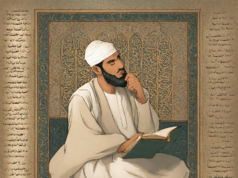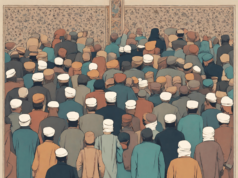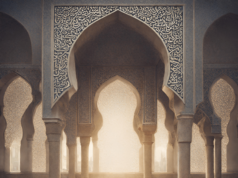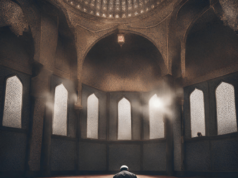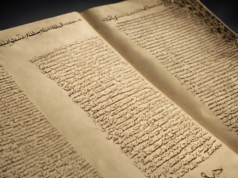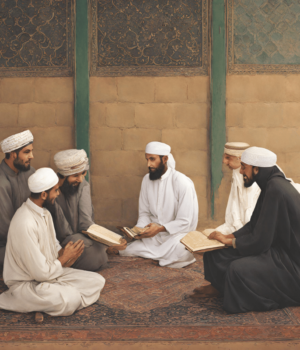
The Necessity of Islaah (Revival, Reform, Recalibration and Course Correction) in the Ummah
Read the next part of this article – What is the Al-Islaah Platform?
The Noble Qur’ān repeatedly shows us how Allāh (SWT) sent messengers and prophets to different nations, tribes and communities with the ḥaqq (truth). It also shows us how quickly and, sadly and surprisingly, easily, their core teachings, vision, and missions got corrupted and distorted after them at the hands of diverse vested interests and insincere elements.
Perhaps the most dramatic and shocking example of such corruption and negative transformation is how the very House of Allāh (SWT) which was built by Prophet Ibrāhīm (as) and his son Ismāʿīl (as) upon the solid foundation of pure, undiluted and unadulterated tawḥīd (Islāmic Monotheism), and to honour the sublime divine imperative of أَنْ لَا تُشْرِكْ بِي شَيْئًا “That you shall not associate or set up anything as a partner (or associate) with Me!”1, gave way to shirk, and got transformed into a “House of Idols” at some point in time after the prophets (as) who built it passed away.
How shocking and alarming it is, then, that the House of Allāh (SWT) which was supposed to be the Global headquarters of tawḥīd and a bastion of resistance against shirk—itself got transformed into a hub for shirk (polytheism and paganism) of the most brazen and blatant variety, and a hotbed for defiance against God, remaining firmly on this deviant track until the triumphant entry of the great grandson of Prophet Ibrāhīm (as), and the true reviver of his monotheistic legacy, i.e. Prophet Muḥammad (Saww).
But what’s really astonishing in all this is how the agents of Shayṭān and the forces of misguidance managed to hijack the very House of God on earth, and worse still, to use it, much as how a virus uses the systems inside its poor host cell to further its own destructive and disruptive goals at the expense of the hapless host cell, to subvert its very raison d’être and purpose of existence!
This is how even the Kaʿbah, which was supposed to be a beacon of tawḥīd, was used by them to promote its very antithesis, i.e. shirk!
The forces of evil were able to secure such a strong footing in the holy sanctuary that when the Prophet Muḥammad (Saww) initially rose to restore the House of God to its original purpose, he was met with such great persecution, torture, and stiff opposition that he was forced to seek refuge away from it in the city of Madīnah, and was barred from even entering it for many years. Such is the insidious nature of bāṭil (falsehood) and such is the curse of shirk (polytheism)! Once it wraps its tentacles around an entity, it takes a Herculean and Himalayan amount of effort to salvage and rescue what needs to be salvaged and rescued from it.
The Qur’ān presents us with other examples of corruption as well in past nations and communities. With Prophet Mūsā (as), we see that his community did not even wait for his death to deviate from his core message, but rather showed great willingness and keenness for abandoning the very first commandment of tawḥīd (monotheism) which he had come to them with, in favour of shirk at the first opportunity that presented itself:
وَجَاوَزْنَا بِبَنِي إِسْرَائِيلَ الْبَحْرَ فَأَتَوْا عَلَى قَوْمٍ يَعْكُفُونَ عَلَى أَصْنَامٍ لَهُمْ قَالُوا يَا مُوسَى اجْعَلْ لَنَا إِلَهًا كَمَا لَهُمْ آَلِهَةٌ قَالَ إِنَّكُمْ قَوْمٌ تَجْهَلُونَ.
We took the Banī Isrā’īl (Children of Israel) (safely) across the sea. They came upon a people devoted entirely to some idols they had. They said: “O Mūsā! fashion for us a god like the gods they have.” He said: “Surely you are a people acting with reckless ignorance! (The Qur’ān: 07:138).
Prophet Mūsā (as) then pointed out to them the deadly and unfavorable fate awaiting the polytheists that his own people were interested in copying and emulating; he remarked:
إِنَّ هَؤُلَاءِ مُتَبَّرٌ مَا هُمْ فِيهِ وَبَاطِلٌ مَا كَانُوا يَعْمَلُونَ.
These are people whose way is destined for destruction, and all that they are doing shall be in vain! (The Qur’ān: 07:139)
This was the state of the Banū Isrā’īl in the lifetime of Prophet Mūsā (as), and this was their level of thanklessness to God despite all the great miraculous favours He bestowed upon them – something Prophet Mūsā (as) saw fit to remind them of at this juncture:
قَالَ أَغَيْرَ اللَّهِ أَبْغِيكُمْ إِلَهًا وَهُوَ فَضَّلَكُمْ عَلَى الْعَالَمِينَ.
He said: Shall I seek for you a god other than Allah when He has favoured you above (all) the nations?! (The Qur’ān: 07:140)
Undeterred by his powerful sermons and admonitions, they nonetheless did embrace shirk (polytheism) at the first opportunity they had after their prophet turned his back on them to go and have his special communion with God. They fell for the deceptive ploy of Sāmirīyy and worshipped the golden calf despite receiving admonition and exhortations from Prophet Hārūn (as) to desist from such grave deviation. This sad and bizarre tale of deviation is well documented in the Quran. (The Qur’ān: 07:148-152, and 20:83-97)
Corruption, decay, degeneration, and deterioration is inevitable in this lowly life. It affects everything from our bodies, to the food and drink we consume, to the environment around us. Religion, and more importantly, people’s understanding and application of it, is not free from this harsh rule.
But when corruption, innovation, decay, and deviation sets in, Allāh (SWT) has an expectation from those who have submitted to Him to do their best to oppose it, and defend and protect the dīn (religion) from all such pernicious influences, so that deviations and innovations are exposed and resisted, and so that they don’t fester into the new religious creed of the people.
The Noble Qur’ān and the Qur’ān-verified ḥadīth literature makes it abundantly clear that whenever deviations and innovations start appearing in any society, it is the duty and the responsibility of the ʿulamā’ (scholars, learned and knowledgeable people) to expose their falsity and falsehood, to raise their voices against them, and to struggle with their pens, tongues, and whatever other resources they have at hand, to bring an end to those deviations and innovations.
Interestingly, we see in the Qur’ān, that this is something which God Almighty expects even from the scholars of other faith communities such as the Jewish community, for instance.
In Sūrah al-Mā’idah (Chapter 5) of the Qur’ān, Allāh (SWT) strongly denounces and criticises the scholars of the Jews for failing to forbid and restrain their people from munkar (evil, vile, and unjust practices) such as unlawfully devouring other peoples’ wealth and property through usury and other fraudulent practices, and giving false testimony; He says:
وَتَرَى كَثِيرًا مِنْهُمْ يُسَارِعُونَ فِي الْإِثْمِ وَالْعُدْوَانِ وَأَكْلِهِمُ السُّحْتَ لَبِئْسَ مَا كَانُوا يَعْمَلُونَ.
And you will see many of them striving with one another to hasten in sin and exceeding the limits, and in their eating of what is unlawfully acquired; certainly evil is that which they do! (The Qur’ān: 05:62)
Then after describing their indulgence in evil in the above verse, the Almighty Proceeds to strongly censure and reprimand their religious scholars and jurists for not forbidding them from indulging in such evil by saying:
لَوْلَا يَنْهَاهُمُ الرَّبَّانِيُّونَ وَالْأَحْبَارُ عَنْ قَوْلِهِمُ الْإِثْمَ وَأَكْلِهِمُ السُّحْتَ لَبِئْسَ مَا كَانُوا يَصْنَعُونَ.
Why do not the learned Godly scholars and the doctors of law (jurists) prohibit them from their uttering sinful words and their eating of what is unlawfully acquired (i.e. illicit gains)? Certainly evil is their handiwork! (The Qur’ān : 05:63)
Similarly, we are informed later in the same chapter that a group of people from among the Banū Isrā’īl were cursed by Prophets Dawūd (as) and ʿĪsā (as) respectively, precisely because of their failure to forbid the evil practices that had become widespread and rampant in their communities. Allāh (SWT) Informs us:
لُعِنَ الَّذِينَ كَفَرُوا مِنْ بَنِي إِسْرَائِيلَ عَلَى لِسَانِ دَاوُودَ وَعِيسَى ابْنِ مَرْيَمَ ذَلِكَ بِمَا عَصَوْا وَكَانُوا يَعْتَدُون.
Cursed were those who disbelieved from among the children of Isrāīl on the tongue of Dawūd and ʿĪsā, son of Maryam; this was because they disobeyed and used to exceed the limit.” (The Qur’ān: 05:78)
The next verse highlights another major factor that made them deserving of receiving such laʿnah (Prophetic curses and malediction):
كَانُوا لَا يَتَنَاهَوْنَ عَنْ مُنْكَرٍ فَعَلُوهُ لَبِئْسَ مَا كَانُوا يَفْعَلُونَ.
They would not forbid each other the evil things (which) they did; how bad was that which they did! (The Qur’ān: 05:79)
Its clear that Allah (SWT) has an expectation from religious people and believers that they should speak out against, and forbid, their co-religionists from evil and deviation when such phenomena emerge and strike roots in society.
This is as far as the Qur’ān is concerned.
When we turn to the teachings and literature of our beloved Prophet (Saww) and the Imams of the Ahlul Bayt (as), we find them echoing the same worldview, and stressing the role of the ʿulamā’ (scholars and people of knowledge and learning) in combating false beliefs and evil practices and warning against them.
This teaching was invoked by Yūnus bin ʿAbd ar-Raḥmān, a noteworthy companion and disciple of Imam al-Riḍā (as), when the corrupt ring leaders of the Wāqifite faction tried to entice him to join them in promoting their false doctrine and erroneous claims about Imāmah. He himself reports that he rebuffed their lucrative offer by saying to them:
إِنَّا رُوِّينَا عَنِ الصَّادِقِينَ (ع) أَنَّهُمْ قَالُوا إِذَا ظَهَرَتِ الْبِدَعُ فَعَلَى الْعَالِمِ أَنْ يُظْهِرَ عِلْمَهُ فَإِنْ لَمْ يَفْعَلْ سُلِبَ نُورَ الْإِيمَانِ…
“We have certainly narrated from the truthful ones (i.e. the Imams of the Ahlul Bayt (as)) that they said: When bidʿah (unIslamic innovations) emerge, it is the duty of the one with knowledge to reveal his knowledge, and if he doesn’t, the light of īmān (faith) is seized from him!”2
In fact, the grandson of the Prophet (Saww), our beloved Imam ImamʿAlī bin al-Ḥusayn Zayn al-ʿĀbidīn (as) in his letter to the scholar Muḥammad bin Muslim bin Shihāb al-Zuhrī (d. 125 AH), clearly points out that Allāh (SWT) has taken/ signed a covenant (mīthāq) with/from the ʿulamā’, to the effect that they shall make clear the guidance revealed in the Book for the people, and that they shall not seek to obfuscate it or undermine it, and this charter has been enshrined/recorded in Sūrah Āli ʿImrān (Chapter 3) of the Qur’ān as follows:
وَإِذْ أَخَذَ اللَّهُ مِيثَاقَ الَّذِينَ أُوتُوا الْكِتَابَ لَتُبَيِّنُنَّهُ لِلنَّاسِ وَلَا تَكْتُمُونَهُ فَنَبَذُوهُ وَرَاءَ ظُهُورِهِمْ وَاشْتَرَوْا بِهِ ثَمَنًا قَلِيلًا فَبِئْسَ مَا يَشْتَرُونَ
And when Allāh made a covenant with those who were given the Book (to the effect that) You shall certainly make it (i.e. the Book and the Guidance revealed therein) clear to the people, and you shall not hide it; but they cast it behind their backs and took a small price for it; so evil is that which they buy. (The Qur’ān: 03:187)
Towards the end of the letter, the Imam (as) also asks al-Zuhrī to ponder carefully and introspect, and sincerely ask himself how many stands/stances has he taken in order to revive the forgotten aspects of His true religion and to bring an end to the falsehoods that have crept into/infiltrated into the religion?
In light of this, every ʿālim (scholar or person of knowledge), khaṭīb/wāʿiẓ/dhākir (religious orator, preacher, public speaker) should pause to reflect, introspect, and ask himself: through the work that I have done, whether written or through speeches, how many dead Sunan (practices) of the Prophet (Saww) and his Ahlul Bayt (as) have I brought to life, and how many Bidaʿ (un-islamic, unhealthy, and unlawful innovations) have I brought an end to in my community?
It is the duty of the scholars and people of knowledge in this Ummah to warn against sectarianism, bandwagonism, and the influence of populist ideologies which so many of our people have unfortunately fallen into and gotten carried away by.
References
- The full text of the Divine Imperative issued to Prophet Ibrāhīm (as) is found in 22: 26 of the Qur’ān. It reads:
وَإِذْ بَوَّأْنَا لِإِبْرَاهِيمَ مَكَانَ الْبَيْتِ أَنْ لَا تُشْرِكْ بِي شَيْئًا وَطَهِّرْ بَيْتِيَ لِلطَّائِفِينَ وَالْقَائِمِينَ وَالرُّكَّعِ السُّجُودِ.
“(And make mention of the time) When we pinpointed for Ibrāhīm the place of the (Sacred) House, (saying) that ‘You shall not associate or set up anything as a partner or associate with Me’; and sanctify My House for those who will perform Ṭawāf (circumambulate) around it, or stand up (for prayer), or bow, or prostrate themselves (therein in prayer).”
↩︎ - Al-Ṣadūq, Shaykh Abū Jaʿfar Muḥammad bin ʿAlī bin al-Ḥusain bin Mūsā Ibn Babawayh al-Qummī. ʿIlal al-Sharāʾiʿ. al-Maktabah al-Ḥaydarīyah, Najaf, 1385 AH/1966 CE., vol. 1, pp. 235-236. (Narration # 1 from Bāb (Chapter 171)). (https://lib.eshia.ir/10107/1/236).
He also narrates it in: Uyūn Akhbār al-Riḍā. Manshūrāt al-Sharīf al-Raḍī, Qum, 1st. ed., 1378 H., vol. 1, p. 103. (Narration # 2 from Bāb (Chapter 10)). (https://lib.eshia.ir/14032/2/103); in the edition of the same book edited by Sayyid Mahdī al-Ḥusaynī al-Lājūrdī and published by Riḍa Mash’hadi, Qum, 2nd Ed., 1363 H. Sh., see: vol.1, p. 113. (https://lib.eshia.ir/86808/1/113).
Also narrated in: Al-Ṭūsī, Shaykh al-Ṭā’ifah Muḥammad bin al-Ḥasan. Al-Ghaybah (Kitāb al-Ghaybah). Eds. Shaykh ʿIbādallah al-Ṭehrānī & Shaykh ʿAlī Aḥmad Nāṣiḥ. Muʾassasat al-Maʿārif al-Islāmiyyah, Qum, 3rd ed., 1425 AH., p. 64. (Narration # 66). (https://lib.eshia.ir/15084/1/64).
Authentication: The content of this narration has been authenticated and deemed reliable by Shaykh Ḥaidar Ḥobbullāh despite the presence of weak narrators in its chain. He writes:
وعليه، فهذه الرواية ضعيفة السند بالرفع، وبضعف محمد بن جمهور العمي، وبعدم ثبوت وثاقة معلّى بن محمد البصري. لكنّ متن هذه الرواية سليم موافق للقواعد العامّة في الدعوة إلى الله ووظائف العلماء والأمر بالمعروف والنهي عن المنكر وغير ذلك.
‘Therefore, this narration is weak in terms of its Sanad (chain) due to it being Marfūʿ, the weakness of Muḥammad bin Jumhūr al-ʿAmmī, and the lack of reliability of Muʿallā bin Muḥammad al-Baṣrī. However, the content of this narration is sound, as it is conforming to the general principles of Daʿwah (calling to Allah), the duties of scholars, enjoining good, forbidding evil, etc.’ (https://tinyurl.com/26k32cpd). Its content is also verified by the Qur’ānic verses such as 05:62-63, 78-79 which showcase the Divine expectation from people of knowledge and the Prophetic curses on those who failed to live up to this sublime Divine expectation.
↩︎
